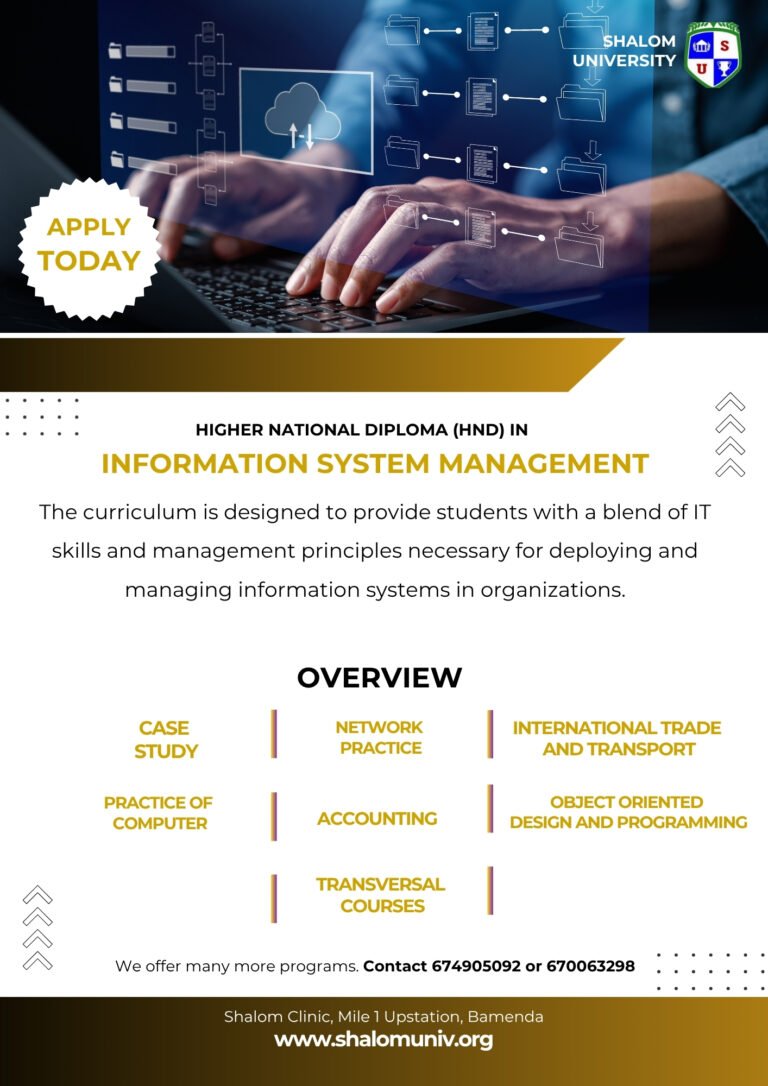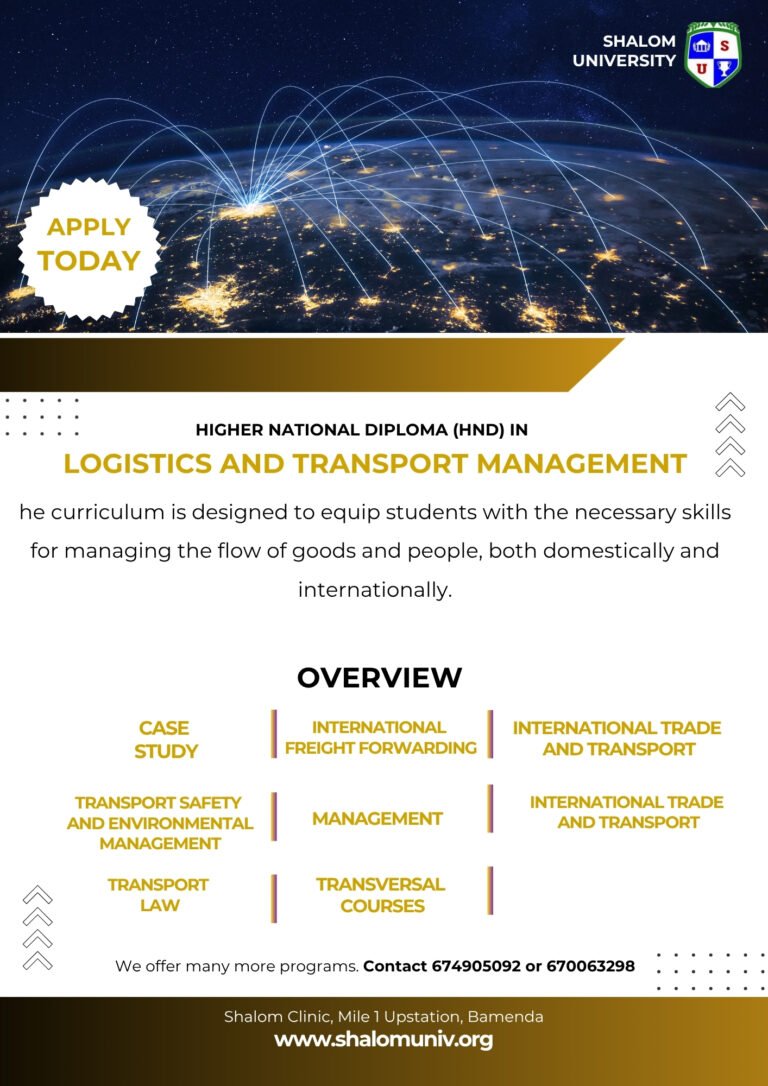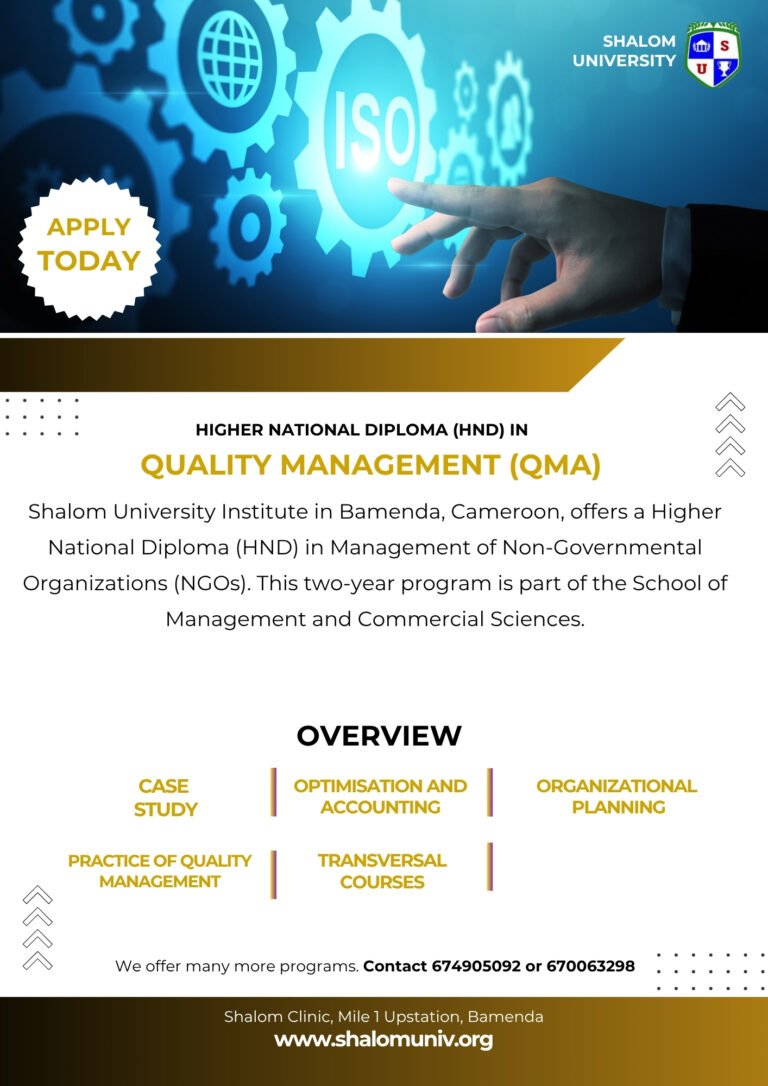In Cameroon’s dynamic business environment, effective management is the key to organizational success, and the role of an assistant manager is pivotal. Assistant managers serve as the vital link between senior leadership and operational staff, ensuring that day-to-day activities align with strategic goals. The HND in Assistant Manager at Shalom University in Bamenda offers a dynamic program for those aspiring to enter this critical role. It is designed to equip students with a robust mix of professional techniques, communication skills, quantitative methods, and economic understanding, all tailored to the Cameroonian business context.
The curriculum at Shalom University emphasizes a blend of theory and practical application, preparing graduates to tackle real-world management challenges in diverse sectors, from private enterprises to public institutions. By focusing on the core competencies required for modern management, the program ensures that graduates are not just ready for entry-level positions but are on a clear path to career growth.
The ASM Curriculum at Shalom University
The HND in Assistant Manager program at Shalom University is structured around a set of core papers that provide a comprehensive and practical education in the field.
Paper: Case Study
The Case Study paper is a vital component that integrates all the theoretical knowledge and technical skills gained throughout the program. It challenges students to analyze complex business scenarios, from resolving internal conflicts to developing strategies for market entry. This is particularly relevant for assistant managers in Cameroon, who must navigate diverse cultural norms, market conditions, and regulatory environments.
The course trains students to:
- Analyze real-world business problems: Based on a given case, students must evaluate the operational, financial, and human resource challenges of a hypothetical or real company.
- Identify strategic and tactical issues: They pinpoint specific problems related to management techniques, communication breakdowns, or economic factors.
- Propose evidence-based solutions: Students formulate practical recommendations based on management principles, economic theory, and quantitative data. For example, a case study might involve analyzing a company’s low employee morale and proposing a new communication strategy or incentive program within the local context.
- Defend their decisions: During formal presentations, students must justify their analysis and proposed solutions, demonstrating their critical thinking and communication skills, which are essential for effective management.
Paper: Professional Techniques
This paper provides students with the practical skills and tools needed to perform day-to-day managerial duties effectively. It focuses on the hands-on aspects of management that enable an assistant manager to support their superiors and lead their teams successfully.
Key topics include:
- Office Management: Procedures for managing office operations, including record-keeping, scheduling, and procurement.
- Project Management: Basic principles of planning, executing, and monitoring projects, a core skill for any manager.
- Human Resources Management: Introduction to key HR functions, such as recruitment, training, performance management, and employee relations, all viewed through the lens of Cameroonian labor laws.
- Financial Management: Principles of budgeting, financial reporting, and financial controls, enabling students to support the financial health of the organization.
Paper: Professional Relations and Communication Tools
Effective communication and strong interpersonal skills are non-negotiable for managers. This paper focuses on developing the professional and communicative competencies needed to build and maintain positive relationships with colleagues, superiors, clients, and other stakeholders.
The curriculum covers:
- Interpersonal Communication: Techniques for clear, effective, and professional communication in various settings, from one-on-one meetings to group presentations.
- Cross-Cultural Communication: Understanding and navigating the diverse cultural and linguistic landscape of Cameroon, which is essential for managing a diverse workforce and interacting with various clients.
- Conflict Resolution: Strategies for mediating and resolving conflicts within a team, fostering a positive and productive work environment.
- Business Writing and Presentation: Developing skills in professional correspondence, report writing, and public speaking, using appropriate tools and techniques.
Paper: Quantitative Techniques
In the modern business world, data-driven decision-making is standard practice. This paper provides students with the mathematical and statistical skills needed to analyze business data, identify trends, and make informed management decisions.
Key areas of focus include:
- Business Statistics: Statistical methods for collecting, organizing, and interpreting business data, including measures of central tendency, dispersion, and probability.
- Forecasting and Modeling: Using quantitative methods to forecast future trends, sales, and performance.
- Decision-Making Models: Applying quantitative models to optimize business processes and make strategic choices.
- Data Visualization: Presenting quantitative data clearly and effectively using charts, graphs, and other visual tools.
Paper: Economic Science
A manager’s decisions are always influenced by the broader economic environment. This paper provides students with a foundational understanding of microeconomics and macroeconomics, enabling them to comprehend the economic forces that affect their organization.
The curriculum covers:
- Microeconomics: Supply and demand, pricing strategies, market structures, and the behavior of consumers and firms within the Cameroonian context.
- Macroeconomics: The broader economic picture, including GDP, inflation, unemployment, and government policy, and how these factors impact businesses in Cameroon.
- International Trade and Finance: An introduction to international economic relations and their implications for Cameroonian businesses, including imports, exports, and currency exchange rates.
- Economic Policy and Impact: Understanding how government policies, such as fiscal and monetary policies, affect the business environment.
A Career in Leadership
Graduates of the HND in Assistant Manager from Shalom University are well-prepared to enter the workforce in various roles, from junior management positions in corporations to administrative roles in small businesses or non-profits. Their proficiency in professional techniques, quantitative analysis, and communication, coupled with a deep understanding of the Cameroonian economic context, makes them highly sought-after candidates. The Case Study paper ensures that they are not just technically skilled but also adept at applying their knowledge to solve real business problems. By providing a practical and contextually relevant education, Shalom University plays a significant role in nurturing the managerial expertise crucial for the sustainable growth of businesses and organizations in Cameroon.




